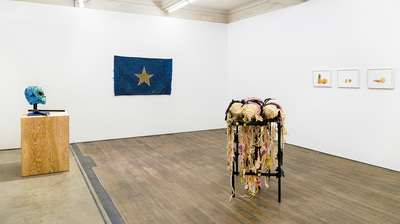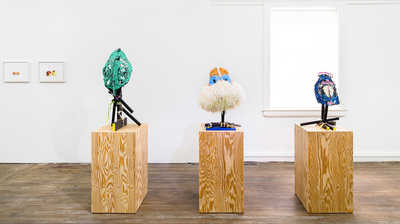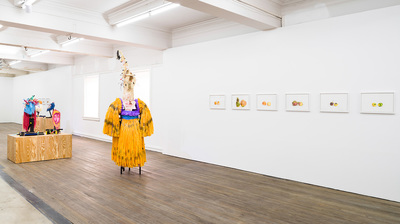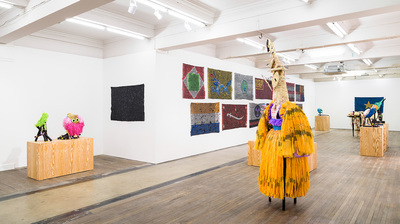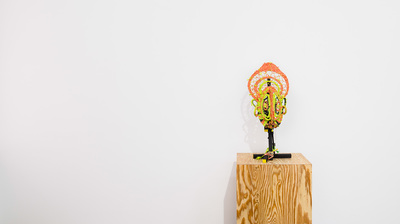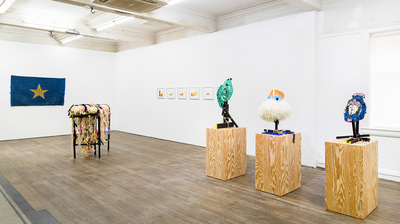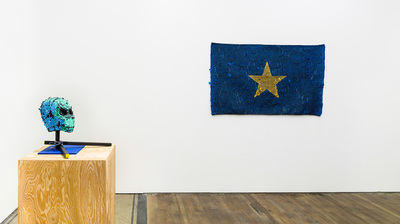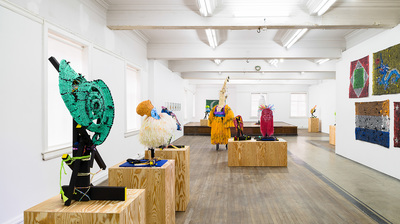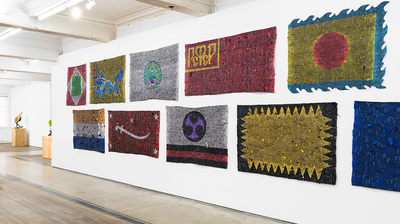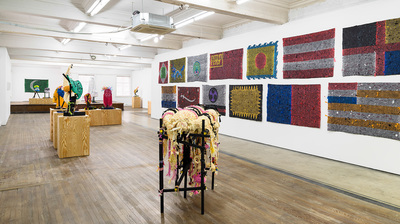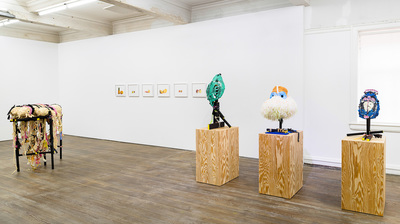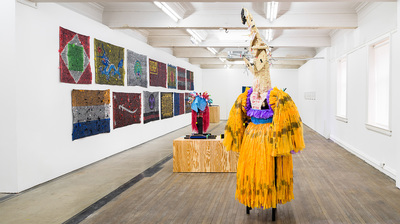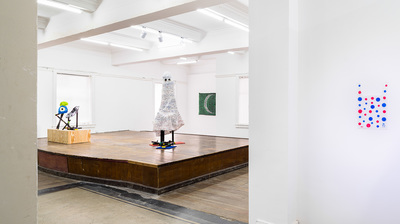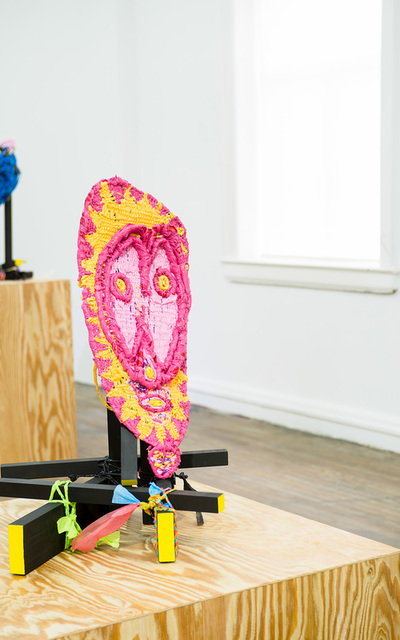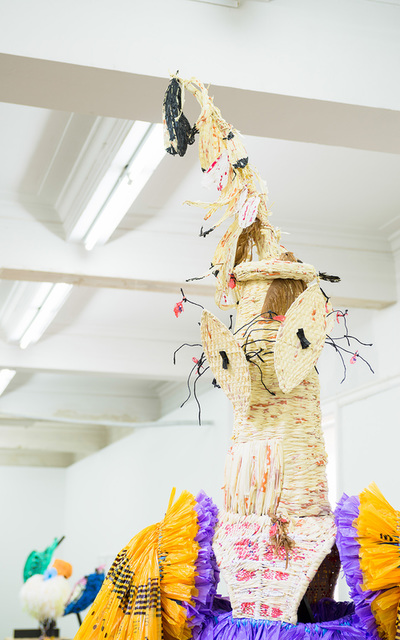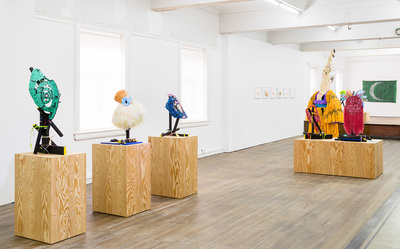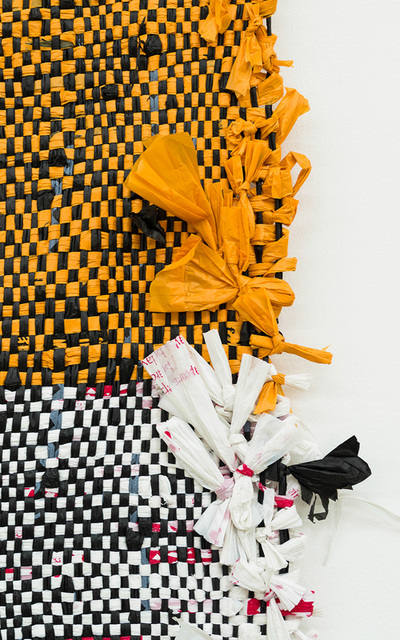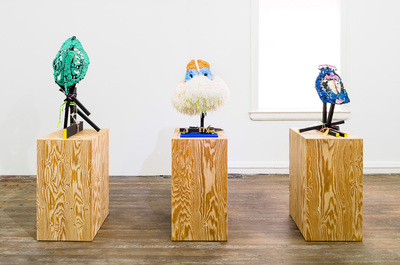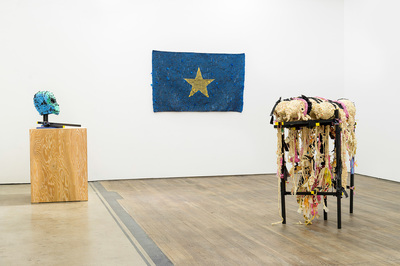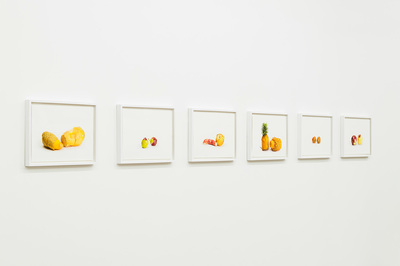500 years / 500年
海蒂·芙欧特 Heidi Voet
Duration: 2015.05.29-2015.07.10
“The plastic bag is a vessel for an ever-changing content”
Plastic bags permeate our lives on a daily basis. They fill our hands, cupboards, and garbage dumps, and they will most certainly outlive us. It is predicted that it will take approximately 500 years for a ‘disposable’ plastic bag to fully decompose. This ubiquitous, often-overlooked, common bag and its 500 year lifespan is a catalyst for Belgian artist, Heidi Voet to explore the notion of change in her first solo exhibition at BANK. Through flags, figurative sculptures, and masks over 30,000 plastic bags becomes both the medium and means for Heidi Voet to revisit the past 500 momentous years of human civilization.
Laboriously weaved out of colored plastic bags and hanging in the main exhibition space are flags of countries that no longer exist. Within the life span of a disposable plastic bag hundreds of nation states have formed and collapsed, changed, and reconfigured. In a world where the history of war and strife is predicated on nationalism Heidi Voet’s colorful flags examine the transient and impermanent nature of so-called national identity.
Amongst these flags are what looks like tribal masks, also made from weaved plastic bags, and displayed on wooden pedestals. While the bag transports items from one state to the next-consumable to consumed, store to home-tribal masks are often used in rites of passage from one state to the next-boyhood to man, life to death; and as the plastic bag acts as a skin around the contents inside, masks disguise the wearer’s identity, enabling them to exhibit behaviors outside social conventions.
In tandem with objects fabricated from bags Heidi Voet presents photographs of different fruits whose skins have been exchanged with others. This comical series, while echoing the skin of the bags, relates to the fantasy of longing to be the other, to assimilate, and to fit in with pre-existing norms. Voet interchanges peels from different fruits as a way to emphasize the destabilizing effects of global trade on the provenance of these fruits.
Heidi Voet repeatedly conflates the historical with the mundane, the universal with the personal, in a spirited way. She positions the plastic bag as a shifting actor in her work to emphasize the notion of impermanence. Her whimsical and quotidian choice of materials follows her earlier work where Voet imbues common, overlooked objects with new value and meaning - through the simple act of making and playing.
HEIDI VOET (b. 1972, Belgium) one of the most provocative female voices working in China, splits her time between Shanghai and Brussels. Her artistic enterprise can be characterized by a wondrous engagement of everyday life and materials. Her work has been shown at the Power Station of Art, Shanghai and is on permanent display at K11, Shanghai. She has also shown at MoCA Shanghai, WIELS Contemporary Art Centre, Brussels, L&M Arts, Los Angeles and IT Park, Taipei.
展期: 2015.05.29-2015.07.10
“塑料袋作为一种容器,装载的内容可以千变万化。”
塑料袋在我们的日常生活中随处可见,它们占据我们的双手、橱柜和垃圾堆,并且拥有比我们长得多的寿命。据估计一个“一次性”塑料袋完全降解大约需要500年。塑料袋这一随处可见、常被忽视的寻常物件和其500年的生命周期便是比利时艺术家海蒂·芙欧特在BANK首次个展的触发点,艺术家在展览中思考“变”的概念。芙欧特用超过3万个塑料袋创作国旗、雕塑和面具,以其为媒介和手段重访人类文明过去500年的重要历史。
用彩色塑料袋悉心编织成的国旗陈列在展览的主要空间中,这些国旗代表的国家如今都已不存在。在相当于一次性塑料袋生命周期的500年间,无数的国家成立、瓦解、变革、重组。战争和冲突的历史往往被认为由民族主义所贯穿,而芙欧特用色彩鲜艳的旗帜揭示所谓的民族主义短暂无常的本质。
陈列在旗帜之间是一系列由塑料袋编织成、放置在木质支架上的看起来像部落面具的作品。塑料袋如同皮肤般包裹其中的物品,将它们转移到不同地点:可供消费到被消费的,从商店到家里。传统部落面具则经常被用于标志状态更替的仪式,如成人礼和葬礼, 面具则赋予佩戴者新的身份,让他们得以展示超越社会成见的行为。
配合塑料袋编织的作品,芙欧特展示了交换了果皮的不同水果的照片。这一有趣的系列呼应塑料袋如同表皮的性质,与渴望成为他人、同化、融入现有规则的幻想相关。芙欧特通过交换原产于不同大洲的水果的果皮,也强调了国际贸易打破既有平衡的力量。
芙欧特不断在精神上将历史性与平凡、普世与个人相融合。她在作品中使用塑料袋作为变化元素进行演绎,来强调无常感。这种对创作材料独特的选择在她之前的作品中也是一以贯之的,芙欧特通过玩耍般的创作赋予日常被人们忽视的物品以价值和意义。
海蒂·芙欧特1972年出生于比利时,是当代艺术中最受推崇的女性艺术家之一。目前主要在布鲁塞尔和上海两地开展艺术实践。她的创作可概括为日常生活和材料的奇妙结合。她常常在略显诡异的装置和图像里灌输一种鲜明的女性主义气质与大众文化色彩。她的作品在K11艺术中心(上海)永久陈列,也曾在上海当代艺术博物馆、上海当代艺术馆、Wiels比利时, L&M Arts纽约和台北IT Park展出过。
海蒂·芙欧特 Heidi Voet
Duration: 2015.05.29-2015.07.10
“The plastic bag is a vessel for an ever-changing content”
Plastic bags permeate our lives on a daily basis. They fill our hands, cupboards, and garbage dumps, and they will most certainly outlive us. It is predicted that it will take approximately 500 years for a ‘disposable’ plastic bag to fully decompose. This ubiquitous, often-overlooked, common bag and its 500 year lifespan is a catalyst for Belgian artist, Heidi Voet to explore the notion of change in her first solo exhibition at BANK. Through flags, figurative sculptures, and masks over 30,000 plastic bags becomes both the medium and means for Heidi Voet to revisit the past 500 momentous years of human civilization.
Laboriously weaved out of colored plastic bags and hanging in the main exhibition space are flags of countries that no longer exist. Within the life span of a disposable plastic bag hundreds of nation states have formed and collapsed, changed, and reconfigured. In a world where the history of war and strife is predicated on nationalism Heidi Voet’s colorful flags examine the transient and impermanent nature of so-called national identity.
Amongst these flags are what looks like tribal masks, also made from weaved plastic bags, and displayed on wooden pedestals. While the bag transports items from one state to the next-consumable to consumed, store to home-tribal masks are often used in rites of passage from one state to the next-boyhood to man, life to death; and as the plastic bag acts as a skin around the contents inside, masks disguise the wearer’s identity, enabling them to exhibit behaviors outside social conventions.
In tandem with objects fabricated from bags Heidi Voet presents photographs of different fruits whose skins have been exchanged with others. This comical series, while echoing the skin of the bags, relates to the fantasy of longing to be the other, to assimilate, and to fit in with pre-existing norms. Voet interchanges peels from different fruits as a way to emphasize the destabilizing effects of global trade on the provenance of these fruits.
Heidi Voet repeatedly conflates the historical with the mundane, the universal with the personal, in a spirited way. She positions the plastic bag as a shifting actor in her work to emphasize the notion of impermanence. Her whimsical and quotidian choice of materials follows her earlier work where Voet imbues common, overlooked objects with new value and meaning - through the simple act of making and playing.
HEIDI VOET (b. 1972, Belgium) one of the most provocative female voices working in China, splits her time between Shanghai and Brussels. Her artistic enterprise can be characterized by a wondrous engagement of everyday life and materials. Her work has been shown at the Power Station of Art, Shanghai and is on permanent display at K11, Shanghai. She has also shown at MoCA Shanghai, WIELS Contemporary Art Centre, Brussels, L&M Arts, Los Angeles and IT Park, Taipei.
展期: 2015.05.29-2015.07.10
“塑料袋作为一种容器,装载的内容可以千变万化。”
塑料袋在我们的日常生活中随处可见,它们占据我们的双手、橱柜和垃圾堆,并且拥有比我们长得多的寿命。据估计一个“一次性”塑料袋完全降解大约需要500年。塑料袋这一随处可见、常被忽视的寻常物件和其500年的生命周期便是比利时艺术家海蒂·芙欧特在BANK首次个展的触发点,艺术家在展览中思考“变”的概念。芙欧特用超过3万个塑料袋创作国旗、雕塑和面具,以其为媒介和手段重访人类文明过去500年的重要历史。
用彩色塑料袋悉心编织成的国旗陈列在展览的主要空间中,这些国旗代表的国家如今都已不存在。在相当于一次性塑料袋生命周期的500年间,无数的国家成立、瓦解、变革、重组。战争和冲突的历史往往被认为由民族主义所贯穿,而芙欧特用色彩鲜艳的旗帜揭示所谓的民族主义短暂无常的本质。
陈列在旗帜之间是一系列由塑料袋编织成、放置在木质支架上的看起来像部落面具的作品。塑料袋如同皮肤般包裹其中的物品,将它们转移到不同地点:可供消费到被消费的,从商店到家里。传统部落面具则经常被用于标志状态更替的仪式,如成人礼和葬礼, 面具则赋予佩戴者新的身份,让他们得以展示超越社会成见的行为。
配合塑料袋编织的作品,芙欧特展示了交换了果皮的不同水果的照片。这一有趣的系列呼应塑料袋如同表皮的性质,与渴望成为他人、同化、融入现有规则的幻想相关。芙欧特通过交换原产于不同大洲的水果的果皮,也强调了国际贸易打破既有平衡的力量。
芙欧特不断在精神上将历史性与平凡、普世与个人相融合。她在作品中使用塑料袋作为变化元素进行演绎,来强调无常感。这种对创作材料独特的选择在她之前的作品中也是一以贯之的,芙欧特通过玩耍般的创作赋予日常被人们忽视的物品以价值和意义。
海蒂·芙欧特1972年出生于比利时,是当代艺术中最受推崇的女性艺术家之一。目前主要在布鲁塞尔和上海两地开展艺术实践。她的创作可概括为日常生活和材料的奇妙结合。她常常在略显诡异的装置和图像里灌输一种鲜明的女性主义气质与大众文化色彩。她的作品在K11艺术中心(上海)永久陈列,也曾在上海当代艺术博物馆、上海当代艺术馆、Wiels比利时, L&M Arts纽约和台北IT Park展出过。

